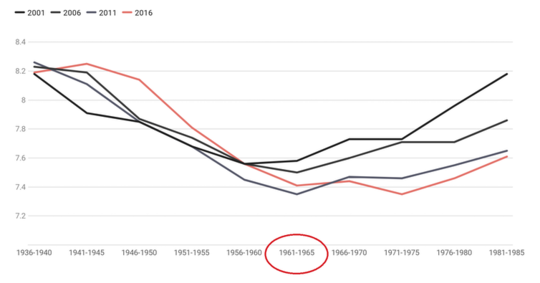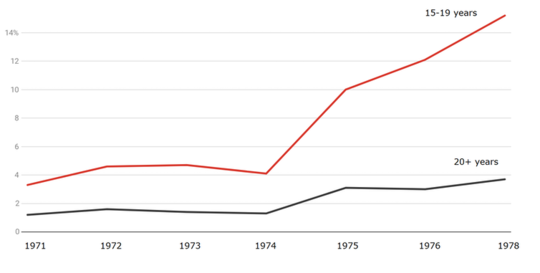 Shutterstock
Shutterstock
It is well-established that recessions hit young people the hardest.
We saw it in our early 1980s recession, our early 1990s recession, and in the one we are now entering.
The latest payroll data shows that for most age groups, employment fell 5% to 6% between mid-March and May. For workers in their 20s, it fell 10.7%
The most dramatic divergence in the fortunes of young and older Australians came in the mid 1970s recession when the unemployment rate for those aged 15-19 shot up from 4% to 10% in the space of one year. A year later it was 12%, and 15% a year after that.
Unemployment rates 1971-1977
At the time, 15 to 19 years of age was when young people got jobs. Only one third completed Year 12.
What is less well known is how long the effects lasted. They seem to be present more than 40 years later.
The Australians who were 15 to 19 years old at the time of the mid-1970s recession were born in the early 1960s.
In almost every recent subjective well-being survey they have performed worse that those born before or after that period.
Subjective well-being is determined by asking respondents how satisified they are with their lives on a scale of 0 to 10, where 0 is totally dissatisfied and 10 is totally satisfied.
Australia’s Household, Income and Labour Dynamics survey (HILDA) has been asking the question since 2001.
In order to fairly compare the life satisfaction of different generations it is necessary to adjust the findings to compensate for other things known to affect satisfaction including income, gender, marital status, education and employment status.
Doing that and selecting the 2001, 2006, 2011 and 2016 surveys to examine how children born at the start of the 1960s have fared relative to those born earlier and later, shows that regardless of their age at the time of the survey, they are less satisfied than those born at other times.
Subjective wellbeing by birth cohort over four HILDA surveys
 Subjective well-being on a scale of 0 to 10 where 0 is totally dissatisfied and 10 is totally satisfied. Regressions available upon request
Subjective well-being on a scale of 0 to 10 where 0 is totally dissatisfied and 10 is totally satisfied. Regressions available upon request
The consistency of lower levels of subjective well-being reported by the 1961-1965 birth cohort suggests something has had a lasting effect.
An obvious candidate is the dramatic increase in the rate of youth unemployment in at the time many of this age group were trying to get a job.
Over time, labour markets can recover but the scars of entering the labour market during a time of sudden high unemployment can be permanent.
The impacts of the early 1980s and early 1990s recessions on young people were alleviated somewhat by the doubling of the Year 12 retention rate and later by the doubling of university enrolments.
But the education sector is maxed out and might not be able to perform the same trick for the third recession in a row.
Reinvigorating apprenticeships and providing cadetships for non-trade occupations might help. Otherwise the effects of the 2020 recession on an unlucky group of Australians might stay with us for a very long time.![]()
About The Author
Jenny Chesters, Senior Lecturer/ Research Fellow, University of Melbourne
This article is republished from The Conversation under a Creative Commons license. Read the original article.
Recommended books:
Capital in the Twenty-First Century
by Thomas Piketty. (Translated by Arthur Goldhammer)
 In Capital in the Twenty-First Century, Thomas Piketty analyzes a unique collection of data from twenty countries, ranging as far back as the eighteenth century, to uncover key economic and social patterns. But economic trends are not acts of God. Political action has curbed dangerous inequalities in the past, says Thomas Piketty, and may do so again. A work of extraordinary ambition, originality, and rigor, Capital in the Twenty-First Century reorients our understanding of economic history and confronts us with sobering lessons for today. His findings will transform debate and set the agenda for the next generation of thought about wealth and inequality.
In Capital in the Twenty-First Century, Thomas Piketty analyzes a unique collection of data from twenty countries, ranging as far back as the eighteenth century, to uncover key economic and social patterns. But economic trends are not acts of God. Political action has curbed dangerous inequalities in the past, says Thomas Piketty, and may do so again. A work of extraordinary ambition, originality, and rigor, Capital in the Twenty-First Century reorients our understanding of economic history and confronts us with sobering lessons for today. His findings will transform debate and set the agenda for the next generation of thought about wealth and inequality.
Click here for more info and/or to order this book on Amazon.
Nature's Fortune: How Business and Society Thrive by Investing in Nature
by Mark R. Tercek and Jonathan S. Adams.
 What is nature worth? The answer to this question—which traditionally has been framed in environmental terms—is revolutionizing the way we do business. In Nature’s Fortune, Mark Tercek, CEO of The Nature Conservancy and former investment banker, and science writer Jonathan Adams argue that nature is not only the foundation of human well-being, but also the smartest commercial investment any business or government can make. The forests, floodplains, and oyster reefs often seen simply as raw materials or as obstacles to be cleared in the name of progress are, in fact as important to our future prosperity as technology or law or business innovation. Nature’s Fortune offers an essential guide to the world’s economic—and environmental—well-being.
What is nature worth? The answer to this question—which traditionally has been framed in environmental terms—is revolutionizing the way we do business. In Nature’s Fortune, Mark Tercek, CEO of The Nature Conservancy and former investment banker, and science writer Jonathan Adams argue that nature is not only the foundation of human well-being, but also the smartest commercial investment any business or government can make. The forests, floodplains, and oyster reefs often seen simply as raw materials or as obstacles to be cleared in the name of progress are, in fact as important to our future prosperity as technology or law or business innovation. Nature’s Fortune offers an essential guide to the world’s economic—and environmental—well-being.
Click here for more info and/or to order this book on Amazon.
Beyond Outrage: What has gone wrong with our economy and our democracy, and how to fix it -- by Robert B. Reich
 In this timely book, Robert B. Reich argues that nothing good happens in Washington unless citizens are energized and organized to make sure Washington acts in the public good. The first step is to see the big picture. Beyond Outrage connects the dots, showing why the increasing share of income and wealth going to the top has hobbled jobs and growth for everyone else, undermining our democracy; caused Americans to become increasingly cynical about public life; and turned many Americans against one another. He also explains why the proposals of the “regressive right” are dead wrong and provides a clear roadmap of what must be done instead. Here’s a plan for action for everyone who cares about the future of America.
In this timely book, Robert B. Reich argues that nothing good happens in Washington unless citizens are energized and organized to make sure Washington acts in the public good. The first step is to see the big picture. Beyond Outrage connects the dots, showing why the increasing share of income and wealth going to the top has hobbled jobs and growth for everyone else, undermining our democracy; caused Americans to become increasingly cynical about public life; and turned many Americans against one another. He also explains why the proposals of the “regressive right” are dead wrong and provides a clear roadmap of what must be done instead. Here’s a plan for action for everyone who cares about the future of America.
Click here for more info or to order this book on Amazon.
This Changes Everything: Occupy Wall Street and the 99% Movement
by Sarah van Gelder and staff of YES! Magazine.
 This Changes Everything shows how the Occupy movement is shifting the way people view themselves and the world, the kind of society they believe is possible, and their own involvement in creating a society that works for the 99% rather than just the 1%. Attempts to pigeonhole this decentralized, fast-evolving movement have led to confusion and misperception. In this volume, the editors of YES! Magazine bring together voices from inside and outside the protests to convey the issues, possibilities, and personalities associated with the Occupy Wall Street movement. This book features contributions from Naomi Klein, David Korten, Rebecca Solnit, Ralph Nader, and others, as well as Occupy activists who were there from the beginning.
This Changes Everything shows how the Occupy movement is shifting the way people view themselves and the world, the kind of society they believe is possible, and their own involvement in creating a society that works for the 99% rather than just the 1%. Attempts to pigeonhole this decentralized, fast-evolving movement have led to confusion and misperception. In this volume, the editors of YES! Magazine bring together voices from inside and outside the protests to convey the issues, possibilities, and personalities associated with the Occupy Wall Street movement. This book features contributions from Naomi Klein, David Korten, Rebecca Solnit, Ralph Nader, and others, as well as Occupy activists who were there from the beginning.
Click here for more info and/or to order this book on Amazon.

























